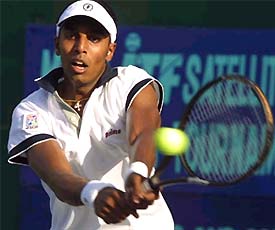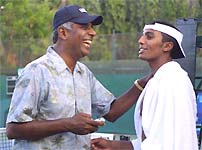Home > Sports > Interviews
The Rediff Interview/Prakash Amritraj
'I don't think I have a weakness'
June 09, 2003
He is of impeccable pedigree. Prakash Amritraj, son of Indian tennis legend Vijay Amritraj, is around six feet and cuts a muscular figure as he confidently stalks the tennis court. He was the singles champion at the USTA Super-national hardcourt championships, which earned him a wildcard entry to the 2002 US Open, where he lost in the first round.
 The 19-year-old, who just completed his second year at the University of South California, has decided to turn professional. What does the harsh world of professional tennis hold for this young lad? Ashish Magotra attempts to find out.
The 19-year-old, who just completed his second year at the University of South California, has decided to turn professional. What does the harsh world of professional tennis hold for this young lad? Ashish Magotra attempts to find out.
You recently turned professional. Why did you decide to play your first tournament in India, considering that the level of tennis would be higher in the United States?
The weather conditions in India are quite a bit harder and it is extremely humid. Some of the places I have played in the US were extremely cold and I would prefer the heat any day to the cold. I have been coming to India ever since I was a kid and I think I am used to the heat. Sure, I would prefer it to be a little bit cooler, but I have no problems with it.
I grew up playing in the States and I think it is very important to mix ATP events with Satellite and Challenger events. A lot of foreign players think it is very easy in India. But I dare them to come and play here. If you are playing one of the good Indian players, Mustafa Ghouse or Vijay Kannan, they would be hard-pressed to win. It takes a lot of heart to win in these conditions. All those who criticize Indian conditions, I dare them to come and play.
Was turning professional a decision that was influenced by your dad or was it your decision?
I think, anything in life, if you do it because someone did it you are never going to ever be really successful, unless you have your heart fully into it. And ever since I was much younger this is what I have always wanted to do.
In the world of professional tennis there are so many youngsters who are really, really good. What makes you think you are at that level as well?
The players you talk about have been playing since they are 11. They quit school when they were nine and have been playing ever since. So that's the edge they have. But I have gone to school and attended two years at college and I think that has prepared me for a lot of things. So, even though I have not completed college, I think I can have the best of both worlds. I can complete my degree afterwards. I definitely think I can compete with them.
Who are your idols?
In today's game, Tim Henman and, maybe, Max Miryni; players who serve and volley, take charge. They are really the kind of players I like.
All-time, there are three players I admire a lot -- my dad, Boris Becker and Stefan Edberg; people who you look upon as heroes on and off the court.
You are basically a serve and volley player. In today's tennis, dominated by baseliners, do you think that style of play is outdated?
I really don't think so. I think people find it easier to stay at the baseline. In the French Open, you have Tommy Robredo, Alberto Costa, Juan Carlos Ferrero…none of them are coming to the net. I truly believe that if a serve and volleyer does his job well he can definitely defeat a Robredo on clay; it's a matter of executing it on the court. No one is taught how to play that way any more. I mean Edberg got to the final and so did John McEnroe, and you can't say there were bad clay courters then. So, I think it's just a matter of learning how to play the right way. Since I have been young my dad (also his coach) has always focussed on an all-round game. I think if I can combine all the aspects of the game well, I can definitely win, even serving and volleying.
You seem to be trying to change your game a little. It's just not serve and volley all the time?
It's a lesson I learnt in the Challenger in Delhi. I was serving and volleying all the time and won the first round match easily. In the second round, I served and volleyed so much that by the time the crunch points came around he [his opponent] was used to my game. So I think I am going to mix it up a little and come in only on the important points.
Most players are usually stronger in one aspect of the game, either mentally or physically. So what kind of a player are you?
I have really tried to combine all elements in my game. I mean if you ask me about my game, I would say I don't think I have a weakness. I don't go like, 'Oh Gosh, I hope he doesn't hit to my backhand/my forehand?' I think the only way I can improve my game right now is to make less mistakes. I go for big shots, play aggressive tennis and have a pretty big serve. At the end of the day it's just a matter of doing all of that consistently and in high percentages.
 In the just-concluded ITF Satellite tournament in Mumbai you were listed as an American player. So what are you? Indian-American, American-Indian or American or Indian?
In the just-concluded ITF Satellite tournament in Mumbai you were listed as an American player. So what are you? Indian-American, American-Indian or American or Indian?
It's a question I get a lot. I think it's more of other people going through that dilemma. Ever since I have been a baby, I have seen myself as nothing but an Indian. If anyone looks at me, it would be weird if they think I am an American. People can think what they want to think.
You had once said, 'Playing for India in the Davis Cup is a dream'. How soon do see that dream coming true?
I have just turned professional and my aim right now is to improve as quickly as possible. As soon as India thinks I am fit to play, I'll be raring to go.
What kind of an influence is your dad, Vijay, on you?
People sometimes really question the way I listen to him. I really regard everything he says as Gospel truth. He has never really led me astray and I truly believe he never really will. I consider him my best friend off the court.
Do you think the son-dad relationship sometimes prevents him from being harsh on you?
I think, because our relationship is so close, if he feels the need to be harsh, I probably deserve it. Or when he is rewarding, I feel I deserve that too. He keeps it real with me, come good or bad.
Do you ever get the feeling you are trying to live up to the standards set by your dad?
No, no, not at all. I think, if anything else, I put higher standards on myself than he does. It's a good balance. He expects a lot of me and I expect a lot of myself. He has a lot of faith in me and that in turn gives me a lot of faith in myself.
Photographs:
JEWELLA C MIRANDA
More Interviews